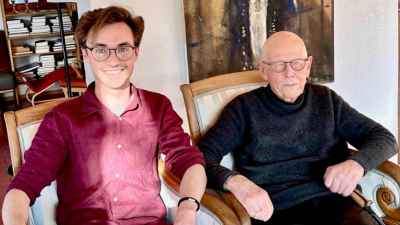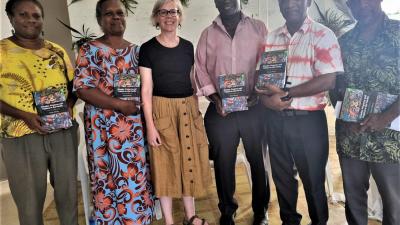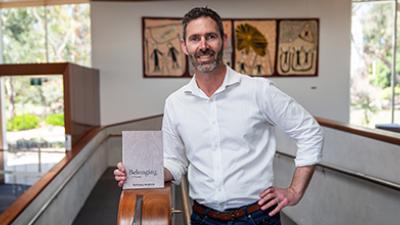
True Justice: Deep Listening aims to transform the education and learning of law through the facilitation of on-Country, immersive experiences. Artwork: Karen Liddle
As the law school of Australia’s national university, it is our privilege and our responsibility to develop the nation’s capacity to listen deeply to First Nations voices.
Together with the North Australian Aboriginal Justice Agency (NAAJA), The Australian National University (ANU) College of Law is pleased to announce the launch of the True Justice: Deep Listening website and EOI process.
The ANU College of Law is a development partner of True Justice: Deep Listening. It will deliver an exemplar course in April 2022 at Mparntwe (Alice Springs) and Uluru with an inaugural cohort of 16 Bachelor of Laws (Hons) students.
The initiative aims to provide Aboriginal-led, on-Country and immersive experiences in the Northern Territory to transform legal education in law.
Pursuing ‘true justice’ through education
ANU Deputy Vice-Chancellor and Dean of the ANU College of Law, Professor Sally Wheeler OBE, MRIA, FAcSS, FAAL, said: “We are delighted to have been chosen as exemplar and development partner by NAAJA to support the design and delivery of this exciting, immersive on-Country course for our students and the nation.
“As the law school of Australia’s national university, it is our privilege and our responsibility to develop the nation’s capacity to listen deeply to First Nations voices and partner with First Nations peoples in pursuit of ‘true justice’.”
The course that the ANU College of Law will deliver as a part of True Justice: Deep Listening is designed to engage law students and increase cultural competency, develop students’ understandings of Indigenous perspectives and critiques about the nature and impacts of the justice system, and enhance students’ understanding of what it means to listen.
ANU Deputy Vice-Chancellor and Dean of the ANU College of Law, Professor Sally Wheeler OBE, says ANU has a responsibility to partner with First Nations peoples in the pursuit of 'true justice'.
The course will also allow students to collaborate and ally themselves with justice for Indigenous peoples, and provide a sustainable path for students to help recalibrate Australian legal education and the legal system for true justice for Indigenous peoples.
“Courses such as this, which genuinely enable students to see and experience the depth, breadth and the intricacies of Aboriginal laws – laws that coexist in harmony with the land and continent – mean that in the future, we will have leaders who truly know and appreciate how the wealth that Indigenous laws and culture bring, can be used to benefit all those who share our lands,” said Professor Asmi Wood from the ANU College of Law.
Priscilla Atkins, NAAJA CEO, described the course as “an incredible opportunity” for students and participants to connect to a range of Aboriginal people speaking from their own roles and authority including Traditional Owners, interpreters, lawyers, and academics.
“We are pleased to work with the ANU College of Law to establish the exemplar course, and to build from this and partner with law schools and other partners across the country. Courses will also be available for lawyers, judges and select participants involved in law or policy,” she said.
“[W]e are also pleased to partner with other Aboriginal organisations including Winkiku Rrumbangi NT Indigenous Lawyers Aboriginal Corporation and the Aboriginal Medical Services Alliance Northern Territory. These partnerships will bring Aboriginal-led, lawyer and health-based content to the course design.”
John Rawnsley (third from right) and Associate Professor Anthony Hopkins (fourth from right) at the 2019 launch of the ANU College of Law-NAAJA partnership for True Justice: Deep Listening.
Opportunities for partners
Ms Atkins added: “The university sector that develops and prepares future lawyers speaks about the value and importance of cultural competency and learning from Aboriginal perspectives. This can’t be done in classrooms alone. It begins by doing so on-Country and through immersive experiences.
“By opening up an Expressions of Interest process, we are calling on partner organisations including employers, law firms, legal bodies and institutions to partner with us and commit to future courses.”
The courses will be run in both the Top End and Central Australia.
Courses can be co-designed with partners and some courses will be available by open enrolment for select categories of participants.
NAAJA’s Principal Legal Officer, David Woodroffe, said: “True Justice is about hearing and learning from Aboriginal perspectives and experiences, and integrating this into the legal system in a way that allows for appropriate recognition, space and respect.
“Because our legal system is built on a colonial history and legacy, we need to address the many issues in a systemic and holistic way to achieve ‘true justice’. It begins by being prepared to engage and listen to our Elders and people who speak from their own authority and doing so in a way where we can listen deeply and be on-Country.”
The logo for True Justice: Deep Listening was developed by Mparntwe Traditional Owner, Karen Liddle.
“The large circle represents the place/community where the law students, elders, guest speakers and Traditional Owners come together. The smaller circles on the outside are the communities and cities that law students, guest speakers come from. The footprints and lines going in are the tracks and roads into the main gathering place for the teaching of ‘True Justice’,” said Ms Liddle.
King & Wood Mallesons provided pro bono assistance to support the development of the website and logo.





